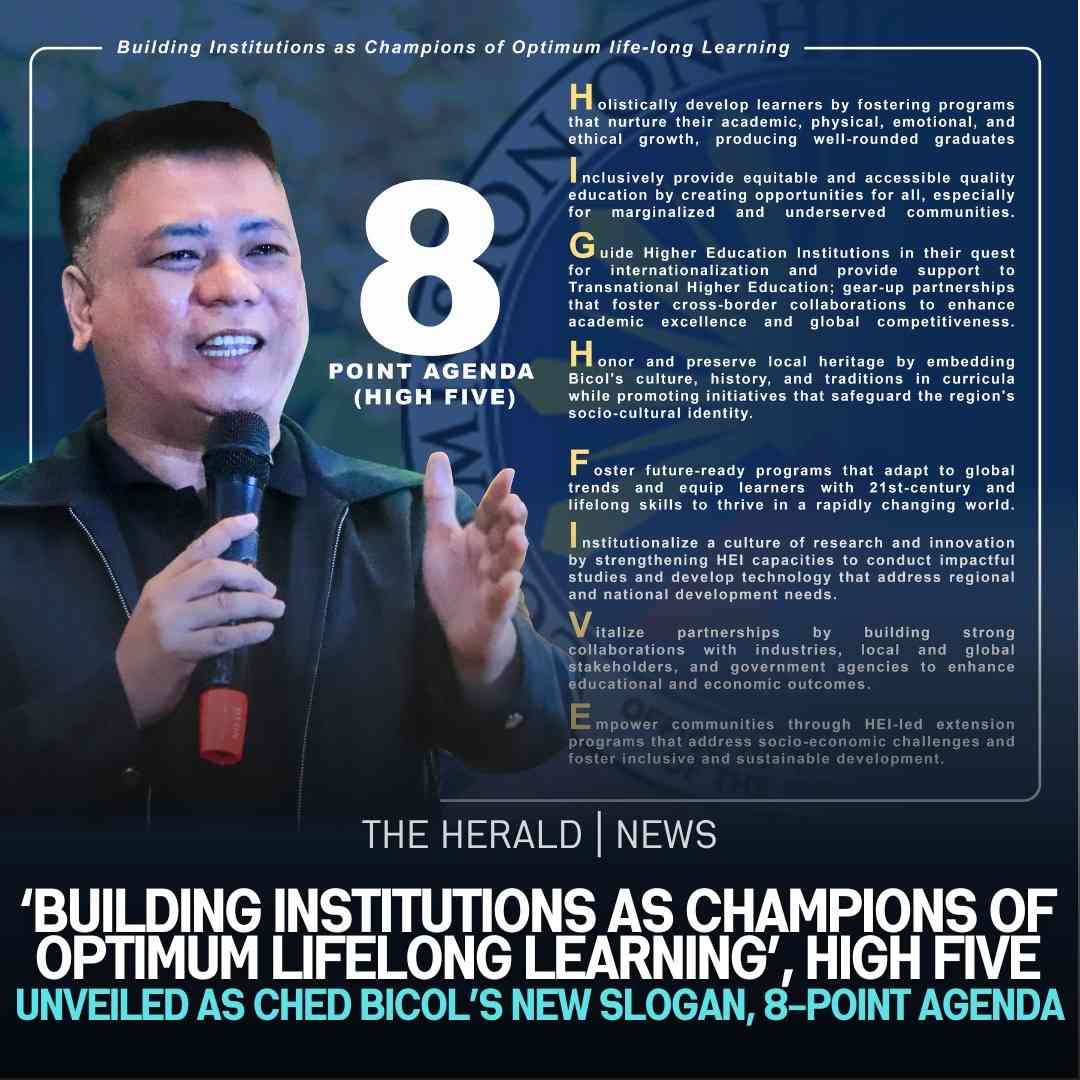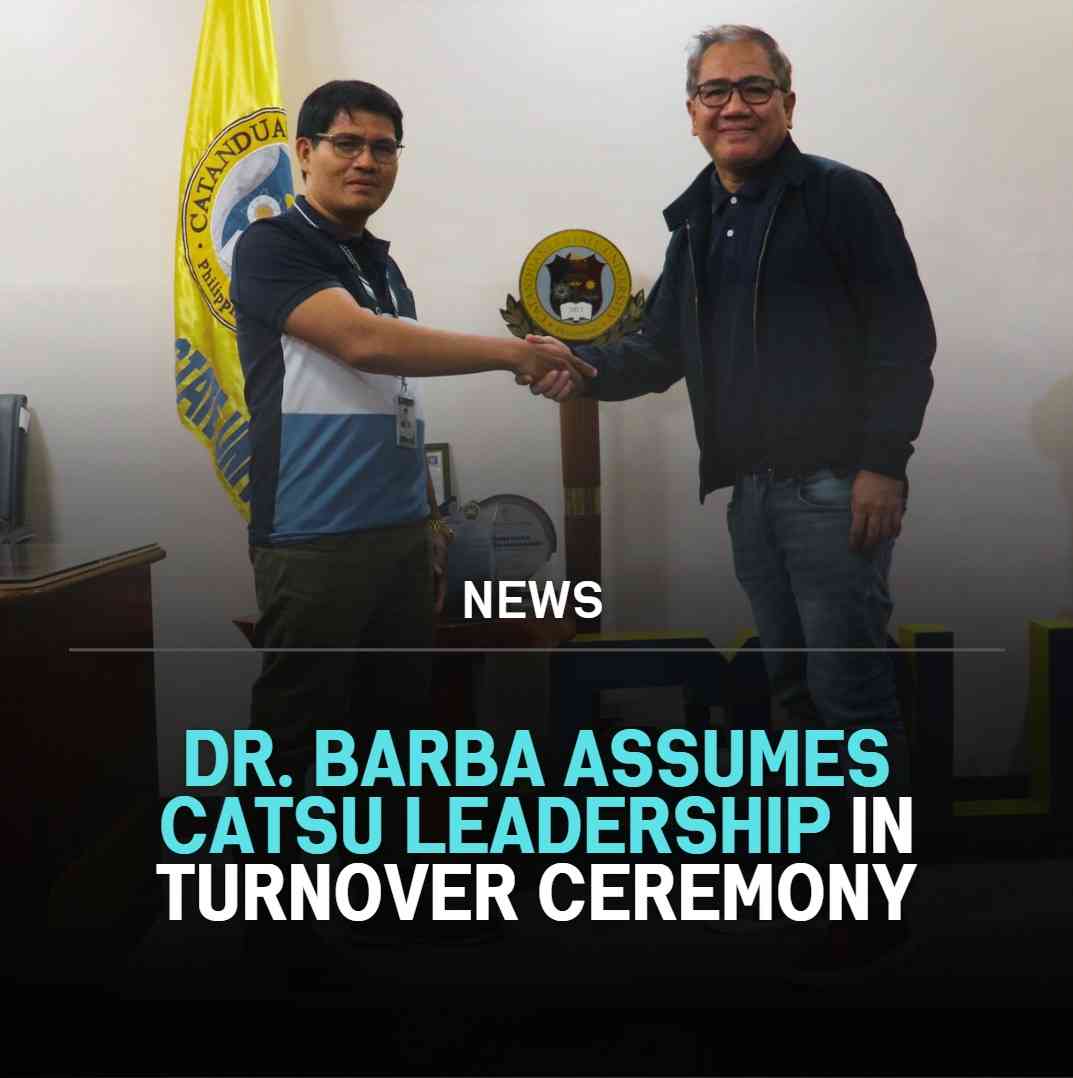
In observance of Fire Prevention Month, Catanduanes State University (CatSU), through the Center for Island Climate Change Solutions, hosted a Fire and Environmental Safety Seminar this Friday, March 7. The half-day event, attended by employees from Virac and Panganiban campuses, aims to raise safety awareness among staff from Security Services, the General Services Unit, and other offices. In his remarks, Engr. Benjamin Hannycel T. Nuyda, Vice President for Administrative and Financial Affairs (VPAFA), told the workers the significance of vigilance in protecting oneself from hazards. "Be vigilant, stay informed, and stay safe," VPAFA urged the participants after defining safety, hazard, and risk in the event at the CatSU Extension Training Hall. For Pollution Control Officer Engr. Bernard H. Rubio, event’s resource speaker, wearing personal protective equipment (PPE) in the workplace is very important, like gloves for electricians. The seminar also included a virtual discussion via Zoom by Senior Project Manager Zaldy T. Tejerero from Tampa, Florida, which covered fire safety engineering. Meanwhile, SInsp. Dennis V. Tadoy, the deputy provincial fire marshal discussed fire safety in the workplace, covering topics such as fire detection systems, automatic suppression systems, and the importance of fire extinguishers. The event, organized in collaboration with the Bureau of Fire Protection, the Philippine Institute of Civil Engineers, and the Institute of Electrical Engineers - Catanduanes Chapter, was also attended by Engr. Rafael R. Manoguid, head of the General Services Unit, who welcomed the participants.

The Commission on Higher Education (CHED) Regional Office V released its new slogan, "Building Institutions as Champions of Optimum Lifelong Learning," along with its 8-Point Agenda, called HIGH FIVE, on March 3, 2025. This slogan encourages Higher Education Institutions (HEIs) in Bicol, including Catanduanes State University, “to go beyond traditional instruction and become champions of excellence, innovation, and lifelong learning,” according to CHED Region V Memorandum Order No. 34 s. 2025, which was signed by newly installed Regional Director Dr. Demetrio P. Anduyan, Jr. Addressed to all Bicol presidents and heads of public and private higher education institutions, CHED Region V memorandum emphasized that the vision for HEIs is not only to provide knowledge but also to lead in preparing future-ready graduates—institutions that don’t just respond to change but actively drive it. The agency aims to achieve this by incorporating advanced technology, relevant curricula, and hands-on learning into academic programs while fostering leadership and critical thinking among students. “HEIs should emphasize digital literacy, interdisciplinary collaboration, and research-driven cultures to develop students' expertise and confidence. This includes internships, mentorships, and global engagement,” the memorandum stated. Dr. Anduyan also wrote on his social media account on March 5, 2025, calling the Bicol 8-Point Agenda a commitment to the holistic development of students, ensuring they receive a well-rounded education that supports academic, physical, emotional, and ethical growth. He further highlighted that CHED Region V is dedicated to supporting international collaboration and integrating Bicol’s heritage into education, while also preparing students with the necessary 21st-century skills. CatSU Officer-in-Charge Dr. Roberto B. Barba Jr.,expressed full support for the slogan and agenda, reaffirming the University's commitment to CHED Region V’s goal of producing globally competitive graduates who will make a meaningful impact and drive change for the nation.

“I think it’s perfect since nobody got hurt. Today was an excellent job,” expressed by Mr. Andrew Hoar, an international disaster specialist who personally observed the earthquake drill featuring simulated emergency scenarios, which was hosted by Catanduanes State University on Thursday afternoon, March 13, in collaboration with various law enforcement and disaster response agencies. Hoar emphasized that safety is a key component of any disaster response, and suggested minor improvements, such as avoiding speeding and backing up vehicles onsite since during the simulation, emergency vehicles, including ambulances and fire trucks, responded promptly to conduct high-angle operations and extinguish a simulated fire at the university gymnasium. The 1st Quarter National Simultaneous Earthquake Drill (NSED) simulated an 8.1 magnitude quake, where at 3:00 PM, a loud siren prompted CatSU employees and students to evacuate their classrooms and offices and head to designated safe areas. Other disaster response officials also provided feedback, applauding the quick response of the rescue teams and praising the inter-agency cooperation. They looked forward to more drills and training to continue improving the disaster preparedness of all involved. During the exercise, the CatSU community, led by Officer-in-Charge Dr. Roberto B. Barba Jr., witnessed simulated fires, search and rescue operations, and a rescue where a victim was lifted using a makeshift zipline from the top of a university building to the flagpole. Vice President for Administrative Affairs Engr. Benjamin Hannycel T. Nuyda expressed his gratitude and commendation to the responders, led by the director of simulation, Provincial Disaster Risk Reduction and Management Office Chief Luis P. Surtida Jr., for successfully conducting the earthquake drill with multiple emergency scenarios. Other participating agencies included the Catanduanes Provincial Police Office, Municipal Disaster Risk Reduction and Management Office of Virac, Bureau of Fire Protection, Philippine Coast Guard, Philippine Army, Philippine Red Cross, CatSU Reserve Officers’ Training Corps, Provincial Engineering Office, Department of the Interior and Local Government, and Provincial Health Office, among others.

Former Officer-in-Charge of Catanduanes State University (CatSU), Atty. Septon A. de la Cruz, formally handed over administrative documents to the new Officer-in-Charge, Dr. Roberto B. Barba Jr., in a turnover ceremony, January 9, 2025. Atty. de la Cruz expressed his well-wishes for Dr. Barba and pinned on the importance of winning the administration's support and streamlining processes to ensure effective leadership. Dr. Barba, in turn, accepted the responsibilities and challenges of leading one of Bicol's premier state universities. As the OIC of CatSU, he aims to strengthen academic standards, develop research facilities, initiate resource generation for sustainability, and simplify processes to enhance efficiency and value-added services to further CatSU's mission and vision for excellence. Appointed by the Board of Regents (BOR) during a special board meeting on January 7, Dr. Barba will serve as OIC pending the selection of a new SUC President III. Prior to this designation, Dr. Barba held several key posts at CatSU, including Dean of the College of Agriculture and Fisheries, BAC Chairman, Executive Vice President, and leader of major university projects. Meanwhile, effective January 10, Atty. de la Cruz assumes the role of Director of the Commission on Higher Education (CHED) Cordillera Administrative Region. This reassignment follows CHED Special Order No. 141, s. 2024, signed by CHED Chairman Dr. J. Prospero E. De Vera III.

Catanduanes State University (CatSU) will soon transition to digital payments for all financial transactions following the recent approval of a Memorandum of Agreement (MOA) with the Land Bank of the Philippines by the CatSU Board of Regents (BOR).The Board approved the proposal from Finance and Administrative Team on November 6 for adoption, which aims to modernize CatSU’s financial processes, enhance operational efficiency, expand financial inclusivity, and provide a secure and convenient experience for students, faculty, and service providers. Specifically, the agreement involves the digitalization of CatSU’s collection, disbursement, and payment systems, aligning with Executive Order No. 170, s. 2022, which mandates the adoption of digital payments for government transactions.

The Catanduanes State University (CatSU) Board of Regents (BOR) approved a Memorandum of Agreement (MOA) with the Environmental Management Bureau Regional Office V (EMB-V) on November 6, 2024, to set up an Ambient Air Quality Monitoring Station at the CatSU Main Campus.This partnership aims to support national environmental standards, research, community engagement, and the adoption of sustainable practices among students, staff, and stakeholders.CatSU will allocate a 16-square-meter space on campus for the equipment, which will provide data on current air pollution levels by measuring meteorological parameters such as wind speed, wind direction, rainfall, solar radiation, temperature, barometric pressure, and other ambient indicators. EMB-V will finance all supply and installation costs and train CatSU personnel, with university students also given opportunities to observe monitoring processes under the supervision of certified technical staff from both CatSU and EMB-V.

To empower them to participate in the government’s digitization initiatives, the Catanduanes State University (CatSU) employees participated in the Philippine National Public Key Infrastructure (PNPKI) orientation conducted by the Department of Information and Communications Technology - Catanduanes (DICT) personnel on December 17, 2024. According to DICT-Catanduanes, the University was selected as one of the institutions to be introduced to the PNPKI as it has been conducting both online and in-person transactions. The Public Key Infrastructure (PKI) helps create, manage, distribute, use, store, verify, and revoke digital certificates, ensuring the security of electronic information transfer for various network activities. DICT resource speaker Mark Andrew Erisare discussed the basics of PKI, and provided scenarios of its implementation, such as preventing long lines, fraud, and facilitating easy access for work-from-home setups.He also discussed the use of PKI in electronic signatures within digital certificates and transactions. Erisare assured that tampering with electronic signatures is not possible when using PKI, as it is designed to provide authentication, confidentiality, integrity, and non-repudiation. PKI also reduces the costs associated with delays in signing, transmitting, approving, and processing. A demonstration of digital signatures using PKI was conducted during the seminar which was held at the Quality Assurance room. Meanwhile, Kerbie Villanueva who was also from DICT, discussed the features and functions of the eGovPH application.




